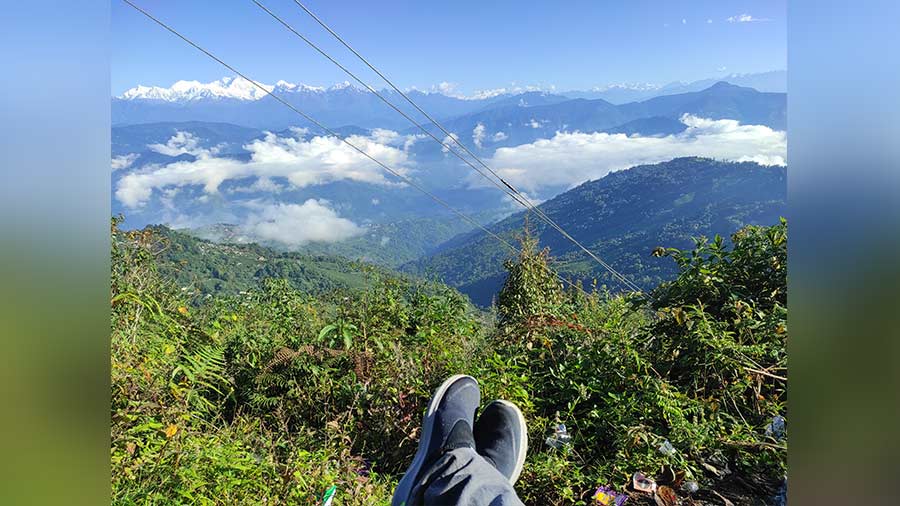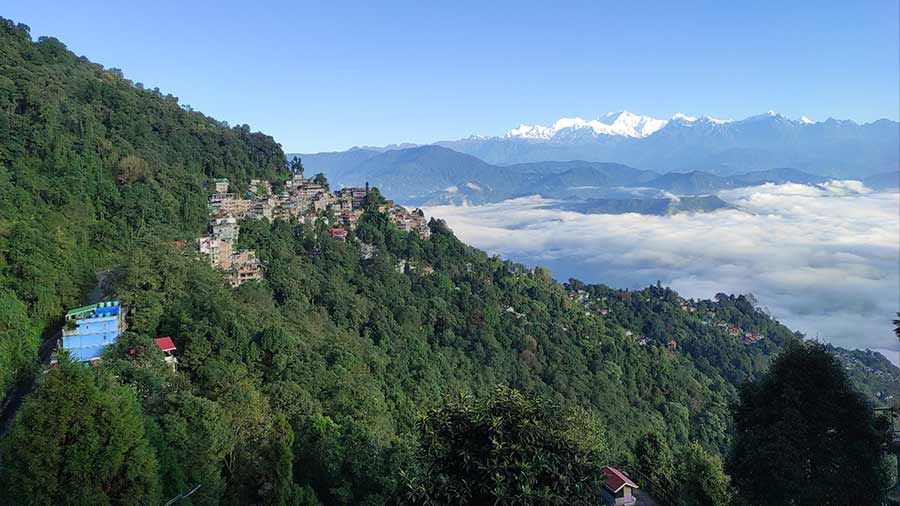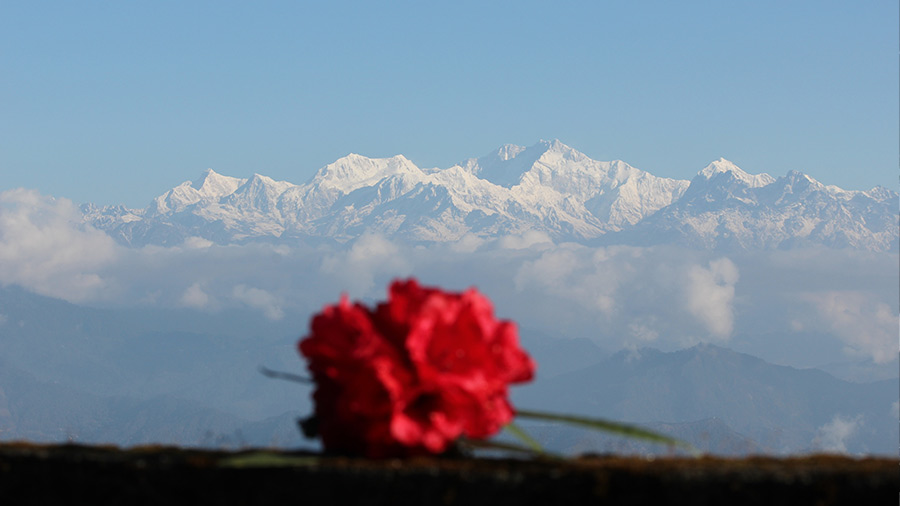(Continued)
It is funny how even in a walk that has only lasted as little as an hour, groups not only break apart into smaller units but members switch companions like tiny particles moving through a chain. Some of it is random but the laws of attraction do play a part as I noticed my friend and I often picking up our pace or slowing down to hear what Parimal sir was saying to Indrani ma’am or Subhendu-da. Right then, we had brisked up our pace to meet Sir who was standing with his back turned towards the sky, investigating something in the hill with a relaxed smile on his face.
When we came close, he pointed at a little spot of brown rock on our right, peeking from between two leafy green swathes of vegetation on the side of the hill.
“Go touch it,” Sir said. There was a layer of water over the rock. Mosses were growing here and there and there were tiny sprouts of green, breaking free into the light to surrender to the wind and our gaze. Although there was no fold in it, the rock was letting water flow through it in a wide but imperceptibly tiny stream. It was not a cascade that I had already seen so many of from the airport ride to Singamari; it was as if the flowing water was part of the rock, coming from somewhere above outside our view.
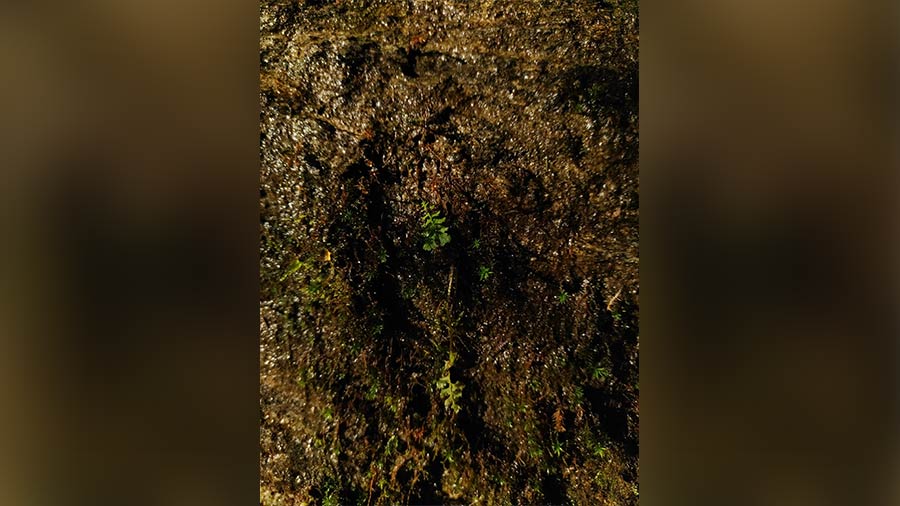
The wet mossy rock of Love Road
“The mosses play a role,” Sir said, “these green hills retain water from rain, from clouds and then trickle it down to the plains. The whole land does in fact. If you think about it, the Himalayas are not just walls where clouds break into rain. It’s a massive sponge that soaks up the water which is then trickled down its length through rivulets that we have built civilisations around.” All of us stood there in silence for a while, surrounding a rock that had suddenly revealed the secret of the whole mountain range. My friend caught a drop of water on his finger from the end of a leaf-blade and rubbed it on his skin. That is how destinies change — I thought — through curiosity. That stray drop just went on a different path from the one the hills had planned. Why must I always follow the hill and never surrender to the curiosity of the universe?
Perhaps worried of such a wayward thought, Dharma, our guide, decided to bark me into focus. We all have a role to play, and yours right now, is to get your shit together and finish that blasted thesis. Yes. I sighed and nodded my head to the bark. Surrendering to the universe is a labour-intensive job and I am a creature of habit, bound by daily hunger, Netflix cravings and chamomile tea at night. We waited, looking at the direction Dharma was barking till we saw a black dog on a leash, held by a middle aged man walking towards our way.
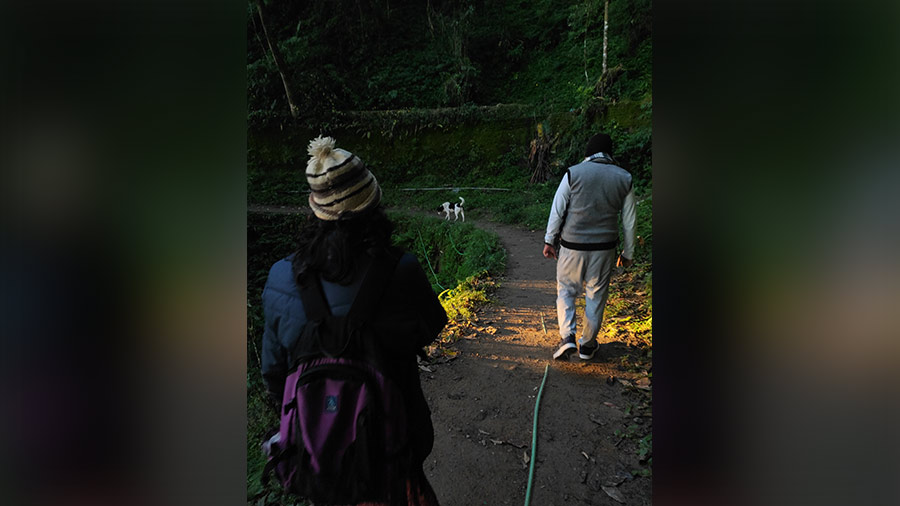
On the Love Road trail, with rainwater pipes in the ground
As we crossed paths, the dogs sniffed each other and the humans greeted one another with small talk. “Tourists? Here for the sunrise?” the man asked us in Hindi. He had made his journey before us and was coming back now. Apparently everyday at dawn, he and his companion would get up to cross most of Love Road as morning exercise. “I work from behind a desk all day and she stays indoors. Without this walk, we both get restless,” he laughed, slapping the flank of the dog, “come, come, Beyni”, he beckoned her and advised us to hurry as well. Apparently, after about half a kilometre, there’s a wonderful clearing to see the sun rise and a rock at the edge to sit on and dangle your feet.
“Did you notice what he called his dog?” Parimal Sir asked me after they had left. “Yes, Beyni. What does that mean?” “It’s behni… meaning behen… sister. Women are called Behni around here as a sign of respect and men, daju, meaning brother. Come, come, Daju!” It was Sir’s turn to beckon our guide. “Let’s go see the sunrise.”
So, with Dharma-daju guiding our path, we followed the stranger’s advice and soon reached the clearing. On our right was the golden sun, slowly rising from behind the dark foliage of the hills and on our left was Kanchenjunga, not hiding between trees anymore, its white peaks catching the rays one by one in a grand luminescence of light. We stood there in silence, looking at the golden peaks, the white clouds underneath and the disarmingly vast sky beyond.
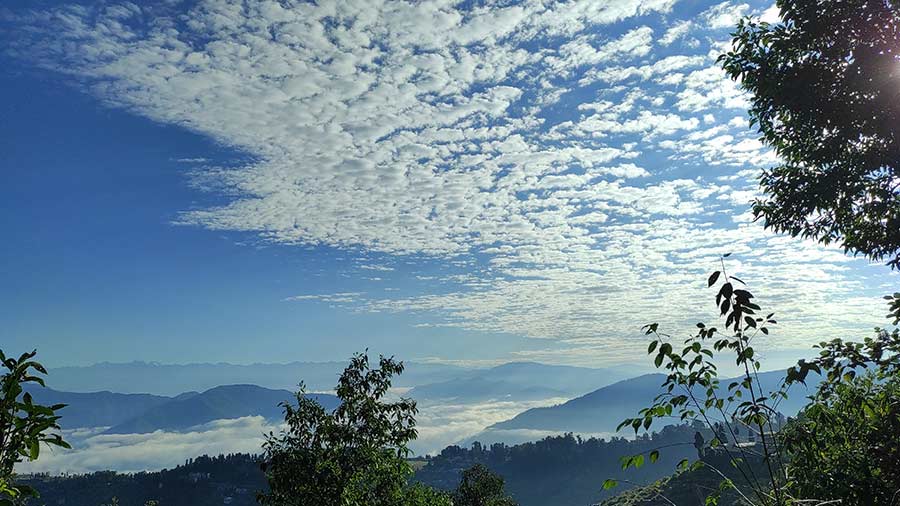
Cotton clouds close in
After a while, I sat on the rock with my friend and Indrani ma’am. I noticed that the mountain was growing bigger the more I looked at it. It was also becoming more beautiful. Compared with yesterday’s view from Chowrasta, this range now felt like something irreplaceable. The sublime then is not lost by its reproduction but merely hidden from restless glances. All good things come to those who wait.
Ma’am was sitting beside me, showing my friend the peaks that make up the face, torso and legs of the Buddha. As the outline revealed itself, I suddenly realised the overwhelming respect my friend had for the mountains. This was beautiful, this was like watching a god at rest. “Those clouds you see under the peaks now would rise up with daylight to cover the sky above the mountain and would drop down again at night, reflecting the heat away,” Ma’am was explaining to my friend.
A cloud cover for the god, a white cotton bedsheet like the one in my room, I thought. Then the comparison struck somewhere and smarted. This was thinking in terms of the mountain, thinking like a mountain. Thinking like a mountain is what had brought Cryptomeria Japonica into these hills. Thoughts, even seemingly harmless ones, become empires when we are careless, spreading with a brute intellectual force that does not allow resistance from any other mind. I suddenly felt tired of looking only at the godly outline of the mountain before me. Then the past hit and the god melted into rocks. I had found the past sir wanted to show us, the past we were searching for on that hill, I had found it and gone beyond, escaping myself in the process and this empire of names that had spread around me for so long. Only later did I realise that the revelation had come with the granite tiles and the Dhupi trees. Stuck inside my head, they had altered the course of my thoughts, opened it up to a historical terrain. I lost the god and even the mountain but saw a row, no, rows of breathtakingly beautiful folds and creases on the curvature of the earth.
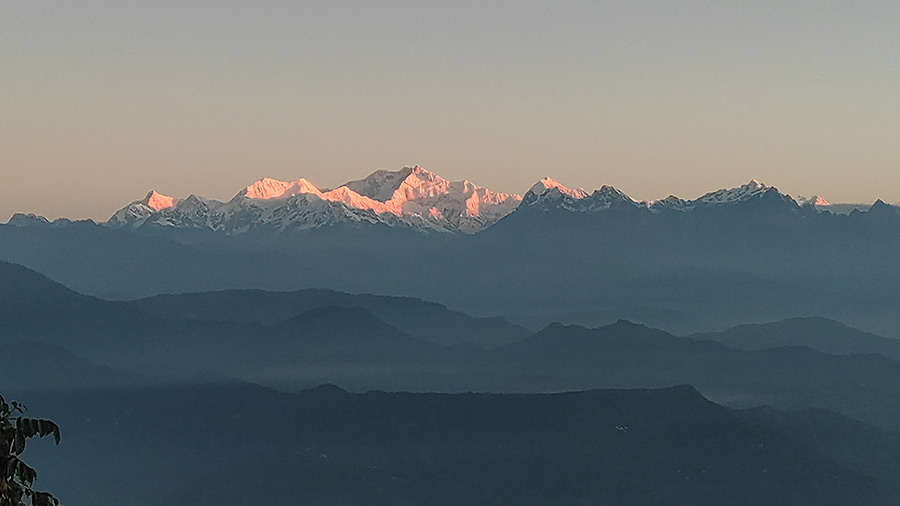
Kanchenjunga during sunrise
There was a story I had read in childhood about Buddha and a mouse. Let me always be the mouse in the mountain, I prayed, surprising myself. A mouse that can explore all crevices and tunnels inside the rock, perfectly vulnerable to the whim of the universe but unlike the mountain, perfectly free to move and turn from its path.
When the golden light filled the range, I also turned from the view. The spectators had already broken up into little groups. Parimal sir was standing with Dharma-daju a hundred or so metres before us; Indrani ma’am was taking Sarbani-di to spot a magnolia she had seen on the last bend, and Subhendu-da was somewhere out of sight. My friend beamed at me, “Told you, you will see paradise today.” The light of the sun had washed our path by now. As we got up, I realised my legs had fallen asleep. I took a few steps and my feet tingled in response. Walking would be different now for a while.
(To be concluded tomorrow)
